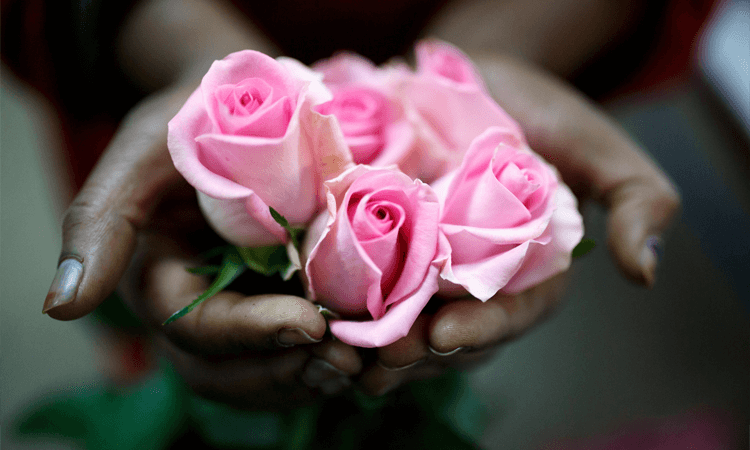Did you know that during colder months, when you buy a bunch of roses in the UK, they are often grown in Africa?
Thousands of roses, will be flown in to the UK and sold this Valentine’s Day so the question is, should we feel bad about this? We rebut some of the common myths to demonstrate that in fact, with Fairtrade flowers, you can feel good about your floral shopping habits.
1. Fairtrade flowers have a lower carbon footprint
One of the most common questions we get is why fly flowers over from East Africa when we can grow them in Europe. So, to find out, Fairtrade commissioned a study about the environmental impact of roses from Kenya compared to those grown in the Netherlands (Treeze, 2018). Greenhouse gas emissions from the production of Fairtrade roses in Kenya were found to be 5.5 times lower and with 6.5 times lower energy demand, even taking into account air transport to Europe. The climate in Africa is ripe for growing flowers, and often in Europe the cost of recreating that environment can come at a heavy carbon footprint.
2. Fairtrade flower farms are reducing water usage
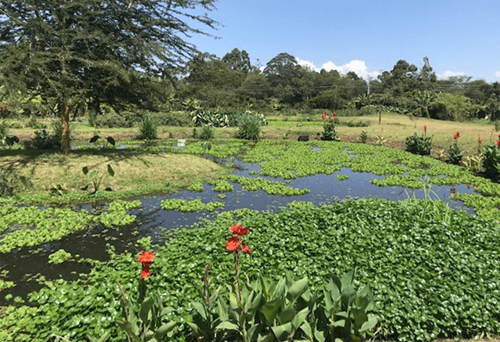
Carbon footprint isn’t the only environmental issue that is being addressed on Fairtrade flower farms. Some farms are collecting rainwater for irrigation, whilst others are using wetlands to purify the water that comes out of the greenhouses, through a series of carefully constructed and efficient pools. This not only purifies the water so that there is no water pollution, but it is cyclical; the water is re-used for watering the plants again and again.
3. Fairtrade flower farms protect the environment
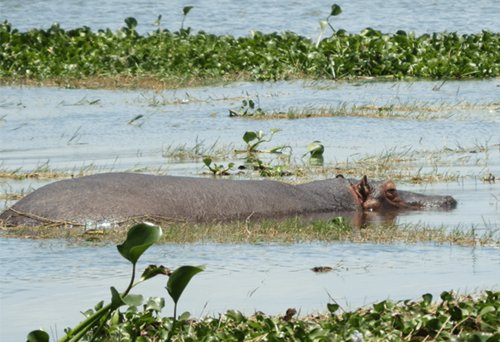
The Naivasha region in Kenya is a popular place for flower farms due to its fertile soils and close supply of water from Lake Victoria. Fairtrade flower businesses are well aware that to maintain a sustainable business they need to look after their environment.
Many Fairtrade flower farms are piloting natural solutions (from cow manure to compost) to increase productivity and tackle pests without harming the environment. In fact, all the Fairtrade farms in Kenya are making positive conservation steps. Some examples include planting 11,000 trees, collecting litter for fuel for a community cooker, and even running a conservation park!
4. Fairtrade is pioneering gender empowerment
Women’s empowerment is firmly on the global agenda, and Fairtrade is leading the way. There have been huge steps forward, but there are still many challenges, and the transitory nature of workers employed in the flower industry means that issues such as harassment are difficult to track. One of the best signs that this is being tackled is that women tend to stay longer on Fairtrade farms, indicating that they are happier with their working environment.
Roughly 50% of all workers on flower farms are women, this is higher than many other sectors, and so there is a real opportunity to pave the way to better gender equality. Fairtrade Africa have run training courses on Fairtrade farms to raise awareness about women’s rights, what constitutes harassment and how to implement an effective gender policy.
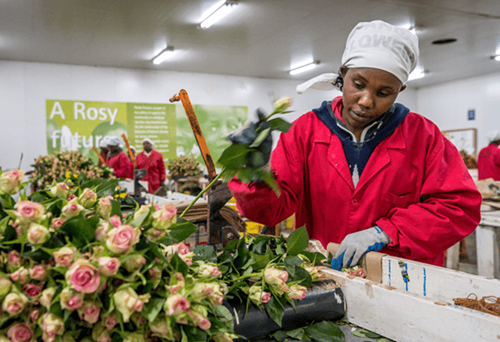
It goes further: Fairtrade Standards require farms to have gender committees, which are working hard to promote equality and protect workers from discrimination. The standards also call for equal representation on all farm committees; the gender committees are crucially helping to change attitudes, challenge negative behaviour and stereotypes about gender and they are having a positive effect on the wider community. This is the key to unlocking sustained and long-term change.
To quote one woman at Bigot flower farm in Kenya: “when we joined Fairtrade, we received trainings and were made aware…there used to be a lot more sexual harassment and discrimination back then…but now, with Fairtrade, we have power and get work done. The gender committee has become somewhere for people to go.”
5. Workers on Fairtrade flower farms are some of the first moving towards a living wage
Low wages. The biggest battle we are fighting today within global supply chains. Overcoming this obstacle is core to Fairtrade’s mission. However, it is complex and cannot be solved by simply asking farms to pay higher wages. A well-known and influential business, Finlay’s Flowers recently announced it plans to close after increases in wages became unsustainable and rendered the farm commercially unviable.
So at Fairtrade we collaborate with a wide range of stakeholders, including businesses, farmers and workers to come up with plans for the sector to increase wages, and within our system we recently reviewed our Flower Standards and introduced a minimum floor wage in 2018.
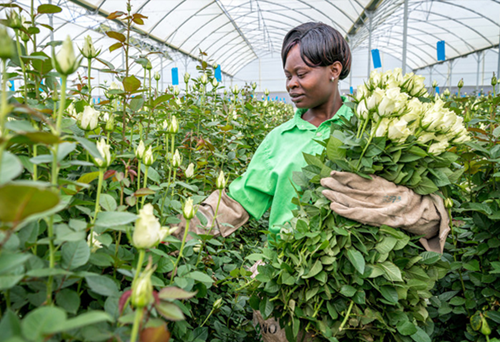
In Ethiopia, where there is no legal minimum wage, this has driven workers’ wages up considerably. Though we still need to increase wages further, in the meantime the Fairtrade Premium supports farmers and workers by reducing their costs, and it covers bursaries for children’s education, healthcare and subsidised food outlets. Some Fairtrade farms offer on-site housing and transport to work.
The Premium is also used to open the door to higher earning roles, with opportunities for adult education courses and training for employees. The crucial thing though is that it’s up to elected committees to decide how to invest the Fairtrade Premium, putting more power in the hands of workers.
6. Fairtrade flowers are worth it
Fairtrade strives towards improving wages for those who produce the goods we consume, providing better working conditions, essential safety equipment and strategies to protect workers from exploitation or issues such as sexual harassment.
I’m sure you’ll agree that this is all essential, but we must also all take responsibility to share the cost equally across the entire value chain, for farms cannot bear the burden alone. Ask yourself: would you be willing to pay more for Fairtrade flowers if the money went back to the workers?
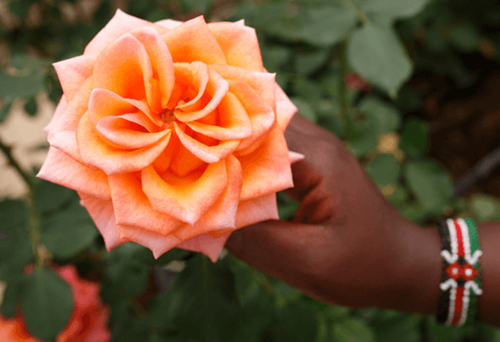
We should all feel blooming good about Fairtrade flowers, for more children have access to education, and workers are protected when you choose Fairtrade.
Fairtrade flowers are a driver of genuine, sustained positive change.
Find out where to you can buy Fairtrade flowers
